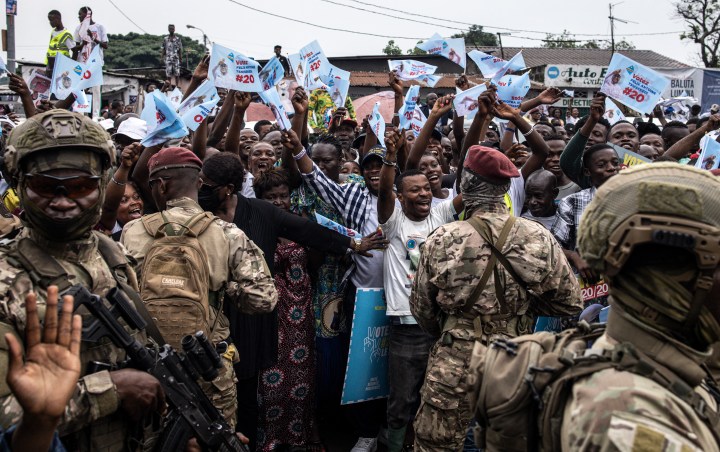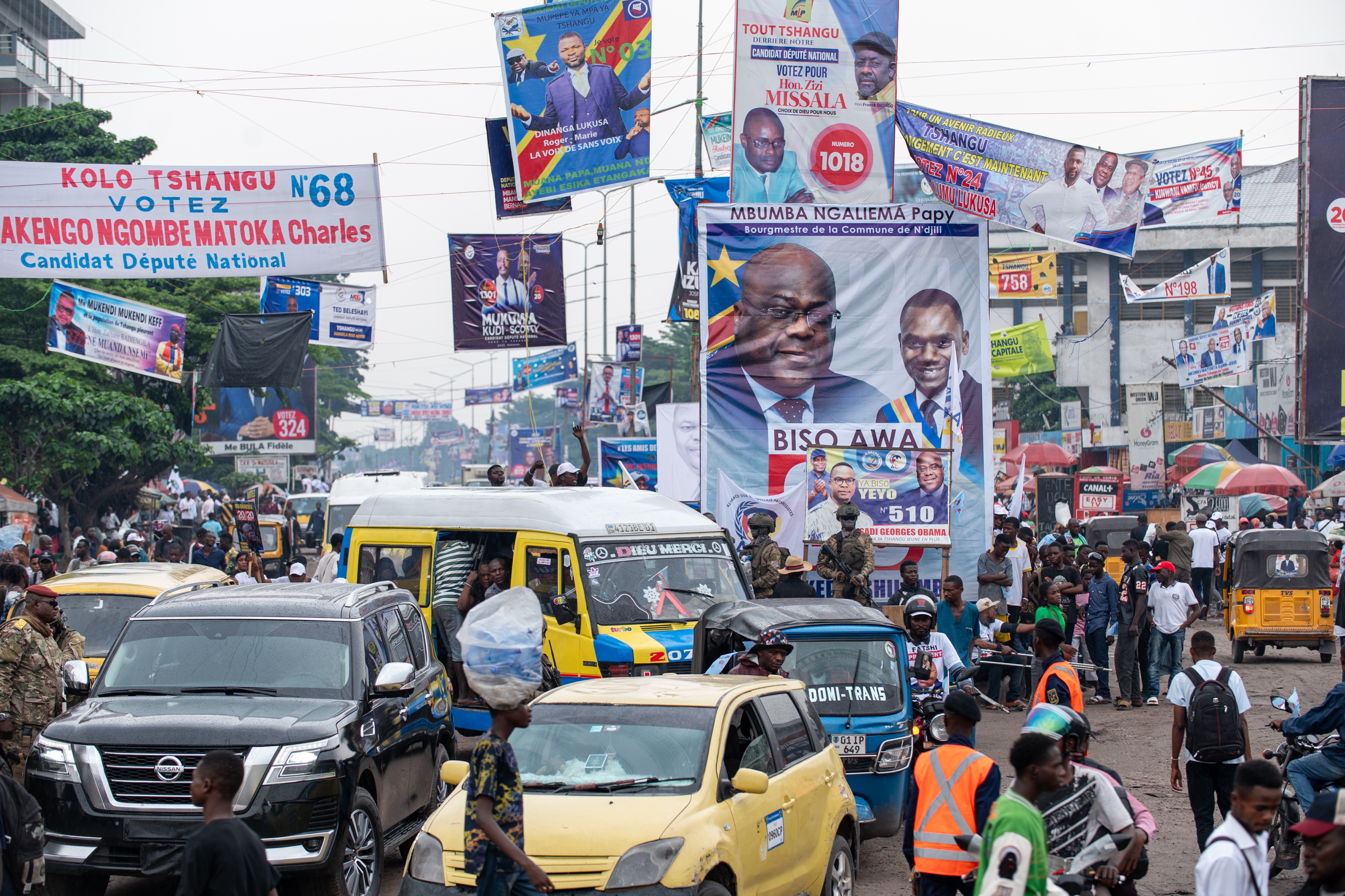DEADLY DEPLOYMENT?
SADC troops set to enter DRC in face of turbulent elections and surge in M23 rebel activity

In what has been a mysteriously silent buildup, South Africa and SADC have committed to deploying a military force into the DRC in an attempt to quell the M23 rebels and maintain stability.
South Africa and SADC could be stepping into a dangerous minefield as they prepare to deploy another military force into wartorn eastern Democratic Republic of Congo (DRC), experts have warned.
Millions of citizens will cast their votes in national elections on Wednesday.
The force of some 5,000 troops, likely from South Africa, Tanzania and Malawi, budgeted to cost about $554-million for its first year of operation, is expected to arrive any moment in a chronically unstable region, riven by vicious fighting among countless armed rebel groups and regional armies.
Leaders of the 16-nation Southern African Development Community (SADC) approved the deployment of the SADC Mission in DRC (SAMIDRC) at a summit in Windhoek in May this year. But SADC has been mysteriously silent since then about further details of the intervention.
Its main aim, though, is clearly to defeat and neutralise the M23 armed rebel group backed by Rwanda. The M23, comprising mainly ethnic Tutsi Congolese, is steadily overrunning more and more territory in North Kivu province in eastern DRC. There is a strong sense of déjà vu here as the same three SADC countries, South Africa, Tanzania and Malawi — then acting under UN command — did rout the M23 in 2013.
But Stephanie Wolters, senior research fellow at the SA Institute of International Studies, said the M23 was now a much stronger force.
“SADC is walking into an…active war, right ahead of, or during an election or right after an election and they’re basically going to be forced to fight the M23” — which, she said, was steadily advancing towards the North Kivu provincial capital Goma.
Read more in Daily Maverick: Is DRC heading for another chaotic election?
And Wolters said the East African Community Regional Force (EACRF) which has been in eastern DRC this year had already begun withdrawing “which leaves a huge vacuum. It’s terrible timing.” The EACRF is pulling out because DRC president Felix Tshisekedi was unhappy that it refused to fight the M23. So that difficult task now clearly falls to SADC.
Tougher, better-organised M23 awaits
She said SADC documents showed that SADC believed it could defeat the M23 again. In 2013, the Force Intervention Brigade (FIB) then comprising just South Africans, Tanzanians and Malawians, though acting as part of the UN peacekeeping mission Monusco, bear the M23 and drove it into Rwanda and Uganda.
Read more in Daily Maverick: South African soldiers and their UN special force in eastern DRC have gone off track
But Wolters said the M23 of 2023 was far more powerful than the M23 of 2013. She noted that Bintou Keita, the UN secretary-general’s special representative for DRC had recently warned that the M23 was now more like a conventional army than a rebel group.
“The M23 is much stronger now and we know it’s because of Rwandan support,” Wolters said. She added that by the time the FIB had deployed in 2013, international pressure had forced Rwandan president Paul Kagame to completely withdraw his support from M23.
But Kagame was not under the same international pressure now.
“We know how determined Kagame is. We know he’s dug his heels in. He’s not going to suddenly step back because he’s facing SADC.”
The M23 appeared to gain strength on Friday when it joined other armed groups, militias and political formations to launch the Congo River Alliance in Nairobi.
The one consolation is that SAMIDRC would not be going in blind as the SADC troops in the FIB could offer on-the-ground intelligence. FIB troops are currently engaged with the DRC army in “Operation Springbok” to prevent the M23 taking Goma on Lake Kivu and the nearby town of Sake.
Wolters said that although the Kenyans in the EAC regional force had already withdrawn, the position of its Burundian and Ugandan contingents was still unclear.
“Burundians troops are already hedging whether they’re going to stay or not stay, they’re not saying,” Wolters said.
The Burundian troops were fighting with the Congolese army against the M23 which was aggravating tensions between Burundi and Rwanda. So with these regional troops still in the field, SADC was “walking into a potential regional war”.
DRC-Rwanda conflict
The main tension is between Kinshasa and Kigali because of Tshisekedi’s accusation that Rwanda is backing the M23 and Kagame’s counter-accusation that the DRC army is backing the Democratic Forces for the Liberation of Rwanda (FDLR) armed group which aims to topple Kagame’s government. Kagame has denied supporting the M23 but the UN Group of Experts on DRC said in its latest report in June that it had “obtained further evidence of direct interventions by the Rwanda Defence Force (RDF) on Democratic Republic of the Congo territory”. And it added that it had “identified several RDF commanders and officials coordinating RDF operations in the Democratic Republic of the Congo”. The experts also catalogued increased M23 atrocities against Congolese civilians, including rape and gang rape.
Keita told the Security Council that “Regional tensions between the DRC and Rwanda have further escalated, heightening the risk of a direct military confrontation that could also draw in Burundi”.
She also noted that 6.3 million people are now internally displaced in DRC, 5.5 million of them in the three eastern provinces. And over 500,000 people had fled their homes, following renewed hostilities between M23 and the armed forces since early October.

Electoral posters are displayed in the streets of Kinshasa, Democratic Republic of Congo, on 18 December 2023. Incumbent President Felix Tshisekedi is seeking a second term in the elections scheduled for 20 December. (Photo: EPA-EFE/ Chris Milosi)
SAMIDRC troop contingent unclear
Wolters said it was still not clear which countries would contribute troops to SAMIDRC; whether the South African, Tanzanian and Malawian troops now in the FIB would be “rehatted” as SAMIDRC; and who would finance the mission. Wolters said privately South African and DRC officials had said that South Africa, Tanzania and Malawi would provide the troops — as they had for the FIB. They also said these would be new troops and not those already in eastern DRC under the FIB. The UN and the DRC government have agreed that Monusco will soon begin withdrawing though SADC has expressed the hope that the FIB would stay longer than the rest of the Monusco peacekeepers.
And SADC has also yet to announce when SAMIDRC would deploy. Last week Keita told the UN Security Council it would deploy “in the coming weeks”. A senior SADC official confirmed this to Daily Maverick but would not be more precise “for security reasons”.
Financing is a major challenge. The May SADC summit approved a draft budget of $554,552,472 for the deployment of a “brigade+” force “with critical maritime, air and artillery support capabilities, logistical support (road transport capabilities, repair and recovery capabilities, casualties/medical evacuation (Casevac/Medevac), intelligence acquisition means and Quick Reaction Force in support of the DRC”.
Wolters said DRC had offered to pay $200-million and had proposed another $246-million should come from SADC. “But even that’s extremely unlikely if not to say impossible. So finance was the big sticking point.”
Wolters had heard no indications that the international community was ready to step up to foot the bill — especially after the “total fiasco” of the EAC regional force, part of the funding of which had come from the African Union’s peace fund — though the AU was still trying to persuade the European Union to pay for it retrospectively.
Failure to capitalise on victory
Paul-Simon Handy, regional director for East Africa and representative to the African Union of the Institute for Security Studies, believes the déjà vu in eastern DRC is largely because the DRC, its neighbouring countries, Monusco and the African Union (AU) failed to translate the 2013 military victory against the M23 into political success.
Read more in Daily Maverick: Resolving political deadlock in Africa’s Great Lakes region requires greater cooperation between governments
For one thing, they did not address the conflict’s root causes, including failing to integrate M23 combatants into the national army of the DRC, he suggested in an ISS Today article on 6th February 2023.
And Handy wrote that the international focus on the Group of Experts’ accusations against Rwanda and Uganda for backing the M23 had exaggerated the regional dimension of the M23 issue at the expense of local and national dynamics, which needed more political attention.
As Handy hinted, the democracy deficits in Rwanda and Uganda are part of the underlying problem, since these trigger destabilising armed rebellions against Kigali and Kampala, from eastern DRC.
Another important contributor to the current instability was DRC’s accession to the East African Community last year which was driven by Kenya. The EAC launched the Nairobi peace talks on DRC and also sent the EAC Regional Force — mainly comprising Kenyan troops — into eastern DRC.
But Kagame was suspicious of Kenya’s entry into the eastern DRC issue because he suspected it was seeking commercial opportunities in the territory — which would be at Rwanda’s expense, sources say.
Tshisekedi expected the EAC regional force to fight the M23 — in large part to try to win votes in this week’s elections as Rwanda and its proxy are highly unpopular among most Congolese. But that was not in the EACRS’s mandate and it chose instead to try to persuade the M23 to lay down arms.
When Tshisekedi saw that the EAC Regional Force was not going to take on M23, he did a U-turn and asked SADC to help instead.
Why exactly SADC — and particularly South Africa — took on the mission is not completely clear. Pretoria clearly resents Rwanda’s growing influence on SADC territory — including its intervention in Mozambique — and has old scores to settle with Kagame over his assassinations or attempted assassinations of political opponents based in South Africa. Some sources say Pretoria was also irritated by Kenya trying to take a lead role in the eastern DRC peace process — which Pretoria regarded as its own prerogative. DM




















 Become an Insider
Become an Insider
Comments - Please login in order to comment.